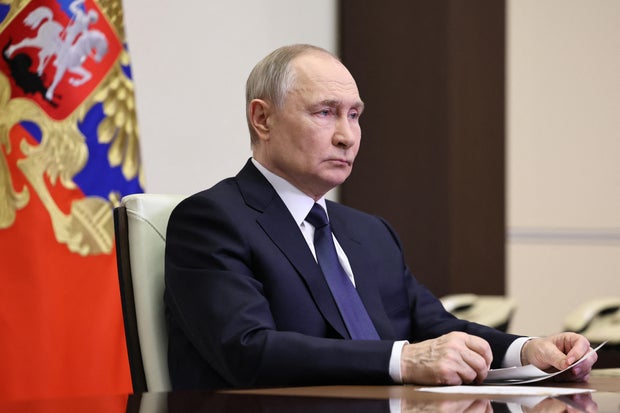Russia’s President Vladimir Putin has ordered a three-day ceasefire in his country’s war on Ukraine, from May 8-10, coinciding with Moscow’s World War II Victory Day commemorations, the Kremlin said Monday. Ukraine quickly accused Putin’s forces, who are more than three years into their full-scale invasion, of violating the last ceasefire Putin declared, on Easter Sunday.
The three-day truce declared by Putin on Monday covers the national holiday in Russia that coincides with Victory in Europe, or VE Day, which is marked across Europe on May 8, the date on which Nazi Germany conceded defeat to the Allied Forces in 1945. The then-Soviet Union was one of those allies, along with the United States, that defeated Adolf Hitler’s fascist regime.
“Russia believes that the Ukrainian side should follow this example,” the Kremlin said Monday in announcing Putin’s order. “In the event of violations of the truce by the Ukrainian side, the Russian armed forces will give an adequate and effective response.”
ALEXANDER KAZAKOV/POOL/AFP/Getty
On Easter Sunday, just hours into the last temporary ceasefire that Putin declared, Ukrainian President Volodymyr Zelenskyy accused Moscow of attempting to create a false appearance of honoring the truce. He said while air and missile strikes had at least slowed, his forces recorded 59 separate instances of Russian shelling and five attacks along the 600-mile front line, which stretches from the northern to southern borders of eastern Ukraine.
“In practice, either Putin does not have full control over his army, or the situation proves that in Russia, they have no intention of making a genuine move toward ending the war, and are only interested in favorable PR coverage,” he wrote.
Putin’s unilateral declaration of another ceasefire comes amid intense pressure from the Trump administration on both Kyiv and Moscow to strike an agreement to end the fighting in the three-year war sparked by Putin’s Feb. 24, 2022, full-scale invasion.
On Saturday, Zelenskyy and President Trump met for about 15 minutes in St. Peter’s Basilica ahead of Pope Francis’ funeral.
After the meeting, Mr. Trump seemed to have changed his tune on Ukraine and the war, saying Zelenskyy is ready to make a peace deal to end the war. He also criticized Russia for its recent attacks in Ukraine, even threatening banking or secondary sanctions on Moscow in a Truth Social post.
“We had a nice meeting, it was a beautiful eating,” Mr. Trump told reporters outside the White House on Sunday, acknowledging that Zelenskyy has a “tough road ahead.”
Asked if he trusts Putin, Mr. Trump answered, “You’ll know in about two weeks,” without elaborating further.
Last week, Vice President JD Vance also warned that Putin and Zelenskyy must strike a deal or the Trump administration would end its efforts to forge a lasting ceasefire. It was the second warning from the Trump administration in less than a week, despite Mr. Trump’s frequent pledges before his second term began that he would end the war immediately.
“We’ve issued a very explicit proposal to both the Russians and the Ukrainians, and it’s time for them to either say yes, or for the United States to walk away from this process,” Vance told reporters.
A couple days after Vance’s warning, Russian Foreign Minister Sergey Lavrov told CBS News’ Margaret Brennan that the Kremlin was “ready to reach a deal” with the U.S. on Ukraine but that some elements still needed to be “fine tuned.”
“The president of the United States believes – and I think rightly so – that we are moving in the right direction,” Lavrov said in an interview Thursday on “Face the Nation with Margaret Brennan.”
Lavrov declined to say what details were being discussed in the U.S.-Russia negotiations, or whether he believed any deal was imminent.
Russia has long said it is open to a negotiated end to the war, but it has refused to offer any concessions publicly, and the Kremlin routinely insists that any ceasefire must deal with what Putin considers the “root causes” of the war, which he has always blamed on Ukraine and the West despite his own ordering of the invasion of a neighboring nation.
Mr. Trump has at times echoed Kremlin rhetoric about the causes of the war, and senior administration officials have made it clear they believe Ukraine will have to yield some of the territory Russia has seized control of over the last decade to end the fighting. While some White House officials have said Russia will also have to make concessions, it remains unclear what the Trump administration will demand from Putin to reach a lasting truce.
